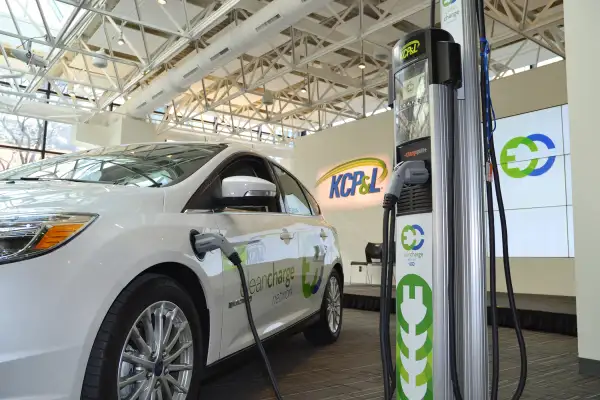This City May Soon Be the Best Place to Own an Electric Car

At the start of 2015, there were a little over 1,000 plug-in electric cars in the greater Kansas City area. By the end of 2015, there will roughly be one public electric vehicle charging station for each of those cars.
In January, the local power and electric company KCP&L announced an ambitious plan dubbed the Clean Charge Network, which calls for 1,001 new electric charging stations to be installed in its region, which is eastern Kansas and western Missouri. Only 40 EV charging stations were operational at the time. By the spring, 150 more had been installed, and the rest are expected to open by year's end.
The massive $20 million initiative is working on the premise of "If you build it, they will come," Chuck Caisley, KCP&L vice president of marketing and public affairs, explained to Automotive News recently.
Among the holdups standing in the way of widespread adoption of electric cars is that charging them has required a lot more time than gassing up a traditional vehicle, as well as the absence of infrastructure, which makes ownership inconvenient and impractical. The Clean Charge Network aims to address both of these issues by making charging stations (hopefully) nearly as ubiquitous as gas stations, and with the installation of 15 special 480-volt DC stations that can charge a Nissan Leaf to 80% in just 30 minutes.
Right now, the only state with more than 1,000 public charging stations is California. It's no surprise, then, that California is also where the most electric cars have been purchased. Last September, California crossed the 100,000 mark for plug-in vehicles. The state with the next most plug-in vehicles is Washington, where around 12,000 electric cars have been registered.
The goal of the project centered in Kansas City is to dramatically boost electric car ownership. “It should be a big jump start for electric cars in the area,” Pasquale Romano, the president and CEO of ChargePoint, which is selling the chargers to KCP&L, said earlier this year.
Nissan, the maker of the world's best-selling plug-in car, the Leaf, is a partner in the initiative. The hope is that the charging stations serve as advertisements for electric vehicle ownership in general: The commonplace sighting of charging stations should get people thinking more about them, while also proving that it's theoretically convenient to charge depleted cars.
As a bonus, the charging stations will be free to car owners for the first two years. The costs of electricity will initially be borne by the host properties—Nissan dealerships, as well as supermarkets, movie theaters, malls, and such. More than enough such properties have been lobbying for KCP&L to install charging stations on site, with the idea that whatever money they'll pay in electricity for charging cars will be made up for in terms of customers shopping or going to the movies while their vehicle batteries are being recharged. After the two-year free period, charging is expected to cost the cheap equivalent rate of around 70¢ per gallon.
As for why Kansas City of all places has decided to jumpstart electric car adoption, well, the city has already demonstrated a desire to be renowned as a forward-thinking hi-tech hub. After all, it was one of the first places to welcome the ultra-high-speed Internet service Google Fiber.
